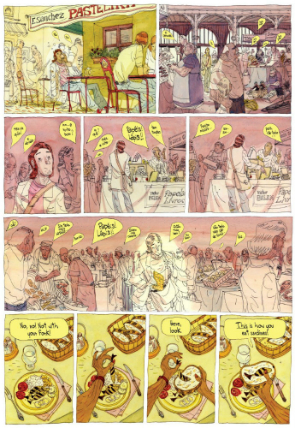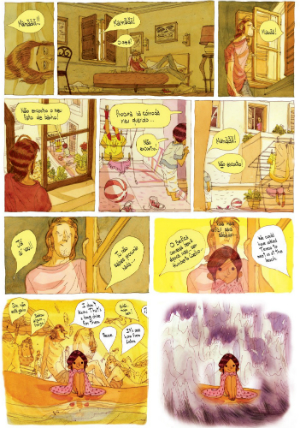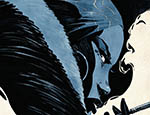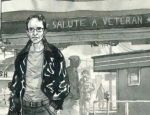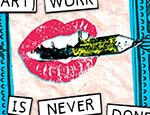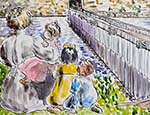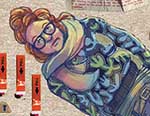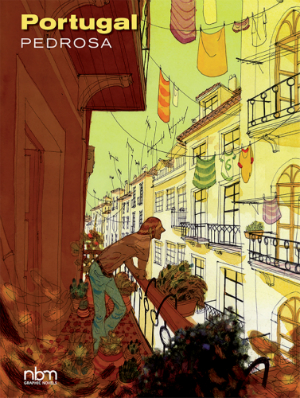 I have to say that I love Portugal more than any comic I’ve read since Moon and Ba’s Daytripper. I don’t know why, I must actually have a thing for sulky pretentious white male protagonists. It’s probably the colour really, and the pacing; the visual onomatopoeia like fizzy nostalgic radio static buzzing through childhood memories or flickering candlelight across faces soft with wine and weariness.
I have to say that I love Portugal more than any comic I’ve read since Moon and Ba’s Daytripper. I don’t know why, I must actually have a thing for sulky pretentious white male protagonists. It’s probably the colour really, and the pacing; the visual onomatopoeia like fizzy nostalgic radio static buzzing through childhood memories or flickering candlelight across faces soft with wine and weariness.
This translation from NBM Publishing takes Cyril Pedrosa’s (author of the acclaimed Equinoxes) bestselling and prize-winning French narrative into English, but leaves the Portuguese dialogue as is –,to be understood or not as per the central character’s experience as we follow Simon Muchat’s incidental exploration into his family’s roots.
The pages of the book are an absolute joy to enter, despite the ennui of the protagonist, light dances across each page, colours saturated with southern sunshine change in the blink of a panel to eerie starlight. The first part of the comic (titled ‘according to Simon’) is mainly in a shifting pallet of monochrome, mirroring Simon’s feeling of impotence and indecision as he drifts through his life frustrating his girlfriend and pretty much everyone else with his indefinable angst. He just doesn’t want to make any more books, although he does manage to decide to go to his cousin’s wedding.
The second part (‘according to Jean’ who is Simon’s father) is much more colourful, almost fully coloured, but earthy, rich and warm. Entirely centred on the family wedding and a lot of reminiscing, larger-than-life characters from Simon’s family getting into hijinks. This is the heart of the book I think, and enables our artist to make another decision – to follow the memory trail and return to his family’s origin.
The third section (‘According to Abel’ from p187 named for Simon’s grandfather, a long absent presence) is different again, somewhere in between in terms of variety of colours, but sun-soaked in a whole different, fresher way. Peppery yellows as different from the sickly hues of the earlier chapter as is the expression on Simon’s face; his cartoonish friendly smile as he listens to his great aunt’s Portuguese uncomprehendingly, and later somewhat more comprehendingly. It is here he finds the peace he needs of course, to begin making again.
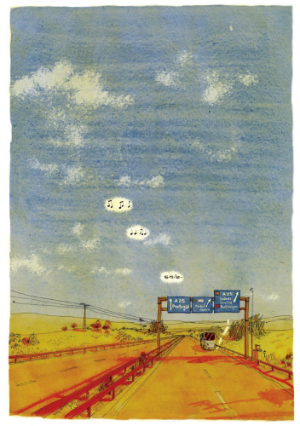 We can take from this that France is a terrible place to live and everyone would be better off in Portugal. Or really, not that at all, but I won’t spoil it for you by explaining.
We can take from this that France is a terrible place to live and everyone would be better off in Portugal. Or really, not that at all, but I won’t spoil it for you by explaining.
What is the saturation point for stories about writer’s block?
Does the narrative of life happening around and despite an absence of pen to paper, (always denied by the obvious fact of its own existence – pen must have met paper, because here we have the proof, a book in hand), hold the same fascination for those other people, the self-identifying uncreatives?
Perhaps. Who hasn’t watched bittersweet days go by that both touch and don’t touch the turmoil inside? I guess it’s a truism that stories that detail everything that happened to you in the months leading up to your recovery from writer’s block contain much which is more interesting than the block itself. The pathos and pattern of everyday existence, which finally break through that bubble with its own undeniable meaningfulness. Anyway it’s one of those books. But a good one.
Simon’s self-discomfort is layered with another relatable transition: reaching the age when family history ceases to be boring. At the heart of the book three aging siblings bicker and bond over their origin stories, making a case for where you’re coming from mattering more than where you’re going. Or perhaps only in the present moment, in drunken candlelight with old friends, can one see the beauty of both past and future, story and possibility of story. How like a cheesy family movie, how French, how Portuguese, how human.
Cyril Pedrosa (W/A) • NBM Publishing, $39.99
Review by Jenny Robins





